Backpacking is a popular outdoor activity that offers a thrilling adventure for beginners. In today’s article we will talked about beginner backpacking tips.
Backpacking it’s involves carrying all your essential belongings in a backpack and exploring the great outdoors on foot.
Here are 10 beginner backpacking tips to help you have a safe and enjoyable outdoor adventure:
- Plan Your Route: Research the trail you’ll be hiking, check maps, and understand the terrain and difficulty level. Choose a route that matches your skill and fitness level.
- Pack Light: Keep your backpack as light as possible. Only pack the essentials, and opt for lightweight gear. A general rule is to carry no more than 20-25% of your body weight.
- Quality Gear: Invest in good-quality gear, especially your backpack, hiking boots, and sleeping bag. Proper footwear is crucial to prevent blisters and discomfort.
- Layer Clothing: Dress in layers to adapt to changing weather conditions. A moisture-wicking base layer, insulating mid-layer, and waterproof outer layer are essential.
- Water and Food: Carry enough water and pack easy-to-prepare, lightweight, and high-energy foods. Don’t forget water purification methods such as a filter or iodine tablets.
- Leave No Trace: Follow the principles of Leave No Trace to minimize your impact on the environment. Pack out all trash, and avoid disturbing wildlife and vegetation.
- Navigation: Bring a map, compass, or GPS device and know how to use them. Mark your trail and set waypoints to avoid getting lost.
- First Aid Kit: Carry a basic first aid kit with essentials like bandages, antiseptic wipes, pain relievers, and any necessary personal medications.
- Know Your Limits: Listen to your body. Take breaks, stay hydrated, and rest when needed. Pushing too hard can lead to exhaustion and injury.
- Inform Others: Let someone know your hiking plans, including your route and expected return time. This is important for safety in case of emergencies.
Contents
Not only does it provide an opportunity to connect with nature, but it also offers numerous benefits for those starting out.
Proper preparation and planning are crucial when venturing into backpacking. From selecting the right gear to understanding safety measures and trail etiquette.
We will cover everything you need to know to make your backpacking experience enjoyable and fulfilling.
So whether you’re looking for a little bit of adventure or ready to embark on an exciting journey.
These beginner backpacking tips will equip you with the knowledge and confidence needed to explore the outdoors like never before.
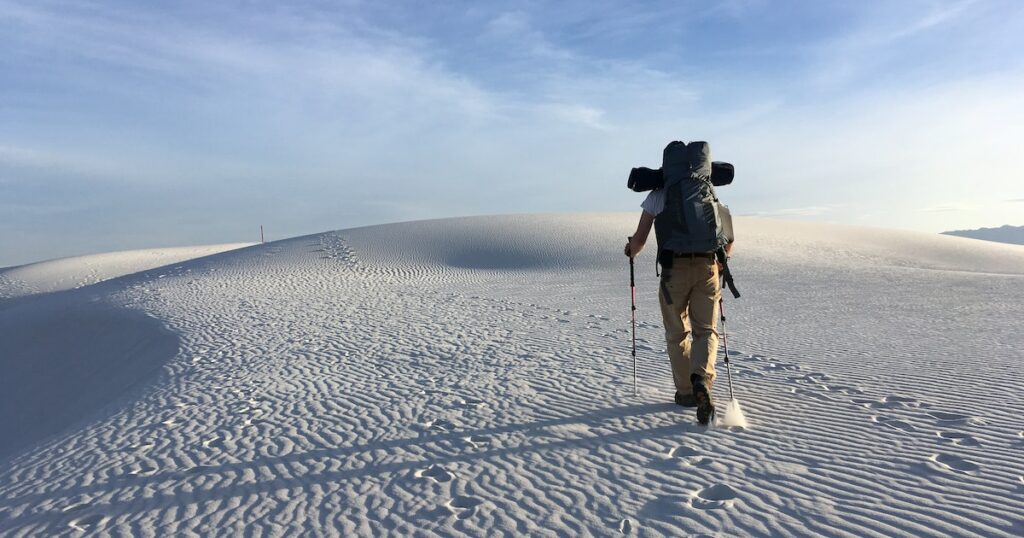
Beginner Backpacking Tips
To build your experience and confidence, it’s best to start with shorter backpacking trips. These trips can be a day hike or an overnight adventure.
By starting small, you’ll get a feel for the backpacking experience without overwhelming yourself.
Pack Light and Bring Only Essentials
When packing for your backpacking trip, remember to pack light. Only bring the essential items that you’ll need during your adventure.
Carrying a heavy backpack can quickly tire you out and make the journey less enjoyable.
Learn Basic Navigation Skills
Having basic navigation skills is crucial when backpacking. Learn how to use a map and compass to navigate through trails confidently.
This knowledge will help prevent getting lost and ensure you stay on track.
Practice Setting Up Your Tent
Before heading out on your first backpacking trip, take some time to practice setting up your tent. Familiarize yourself with its components and learn how to pitch it properly.
This way, when you’re out in the wilderness, you won’t waste time struggling with setting up camp.
Remember that these tips are just the beginning of your backpacking journey! As you gain more experience, you’ll discover new techniques and tricks that work best for you.
Don’t be afraid to ask experienced backpackers for advice or join hiking groups to meet fellow outdoor enthusiasts.
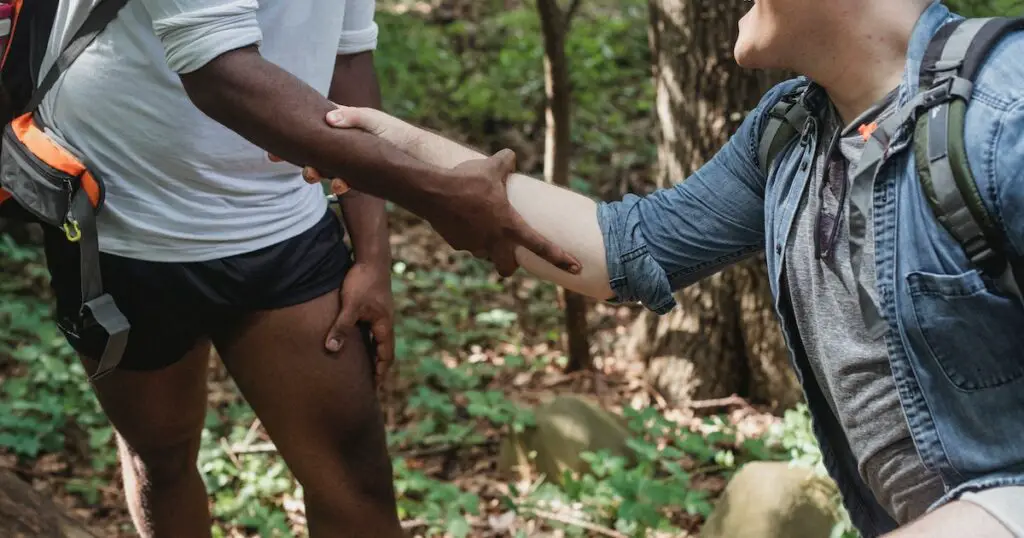
Essential Backpacking Skills for Beginners
Knowing how to pack your backpack is crucial. Distributing the weight evenly will make your journey more comfortable and prevent strain on your back.
Here are some tips:
- Place heavy items close to your back and in the middle of the pack.
- Use compression straps to secure and stabilize the load.
- Pack frequently used items within easy reach.
Basic First Aid Skills Every Beginner Backpacker Should Know
In the wilderness, accidents can happen, so it’s important to be prepared. Here are some basic first aid skills every beginner backpacker should know:
- Learn how to clean and dress wounds properly.
- Familiarize yourself with common injuries like sprains and blisters.
- Carry a first aid kit with essential supplies such as bandages, antiseptic wipes, and pain relievers.
Techniques for Purifying Water in the Wilderness
Safe drinking water is vital while backpacking. Here are some techniques for purifying water in the wilderness:
- Boiling: Bring water to a rolling boil for at least one minute.
- Filtration: Use a portable water filter or purification system.
- Chemical Treatment: Add water purification tablets or drops according to instructions.
Tips for Cooking Meals on a Portable Stove
Cooking delicious meals while camping can enhance your outdoor experience. Consider these tips when cooking on a portable stove:
- Choose lightweight cookware that is easy to clean.
- Plan simple meals using dehydrated foods or pre-packaged options.
- Practice proper stove safety by keeping flammable items away from the flame.
By mastering these essential backpacking skills, you’ll be well-prepared for your hiking adventures in the mountains or any other outdoor setting!
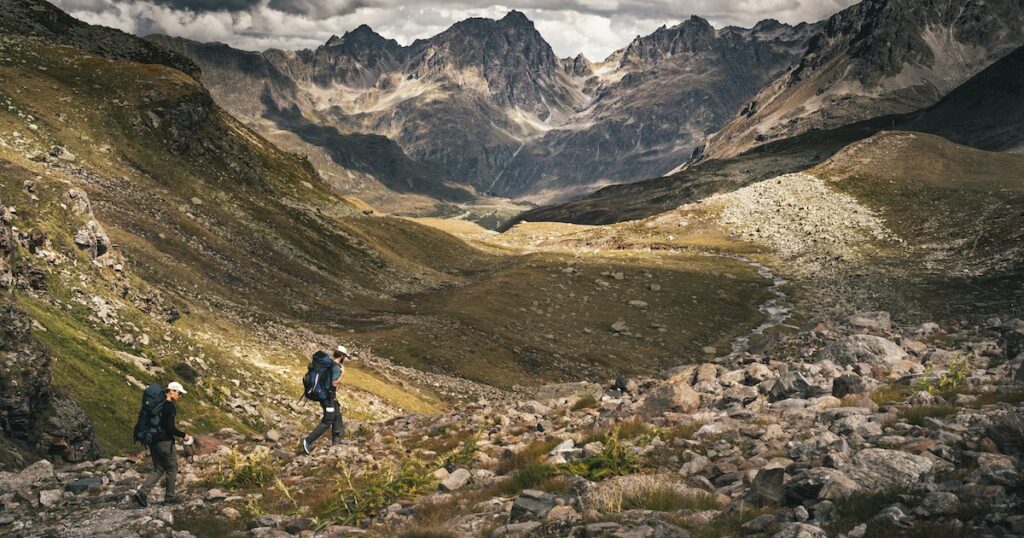
Common Mistakes to Avoid in Research and Planning
One common mistake beginners make when planning a backpacking trip is failing to research trail conditions and weather forecasts beforehand.
It’s important to know what you’re getting into before hitting the trails.
If you don’t check the trail conditions, you might end up on a difficult or dangerous route that you’re not prepared for.
Similarly, neglecting to check the weather forecast can leave you ill-equipped for sudden changes in temperature, rain, or storms.
Overestimating daily mileage capabilities when planning your itinerary
Another mistake many beginners make is overestimating their daily mileage capabilities when planning their backpacking itinerary.
It’s easy to get excited and think that you can cover long distances each day. But it’s important to be realistic about your physical abilities and the terrain you’ll be hiking on.
Pushing yourself too hard can lead to exhaustion and injuries, making your trip less enjoyable.
Failing to obtain necessary permits or permissions for certain areas
Obtaining necessary permits or permissions for certain areas is often overlooked by beginners during the planning process.
Some popular backpacking destinations require permits due to limited access or environmental concerns.
Failure to obtain these permits can result in fines or being denied entry into those areas.
Make sure to do your research and find out if any permits are required for the trails you plan on exploring.
Ignoring safety considerations, such as wildlife encounters or potential hazards
Safety considerations should always be a top priority when backpacking.
Beginners sometimes ignore these considerations, putting themselves at risk of wildlife encounters or other potential hazards.
It’s essential to familiarize yourself with the local wildlife and understand how to safely interact with them if encountered on the trail.
Being aware of potential hazards like steep cliffs, river crossings, or extreme weather conditions will help keep you safe during your adventure.
By avoiding these common mistakes in research and planning, beginners can have a smoother and more enjoyable backpacking experience.
Remember to research trail conditions and weather forecasts, be realistic about your daily mileage capabilities.
Obtain necessary permits or permissions, and prioritize safety considerations. Happy backpacking!

Selecting the Right Gear and Clothing for Backpacking
To have a successful backpacking trip, it’s crucial to choose the right gear and clothing. Here are some essential tips to keep in mind:
Backpack Size and Fit
When selecting a backpack, make sure you choose the right size that can comfortably hold all your gear.
A backpack that is too small will leave you struggling to fit everything in, while one that is too big may lead to an uncomfortable and unbalanced load.
Pay attention to the fit of the backpack. It should sit snugly against your back and distribute weight evenly.
Sleeping Bag and Tent Selection
Your sleeping bag and tent are vital for a good night’s sleep. Look for a sleeping bag that suits the weather conditions you’ll be facing on your trip.
If it’s going to be cold, opt for one with proper insulation.
Similarly, consider the size and weight of your tent; it should be lightweight enough to carry but also provide adequate protection from rain or wind.
Clothing Layers for Different Weather Conditions
Weather conditions can change quickly while hiking, so it’s important to dress appropriately.
Layering is key here! Start with a moisture-wicking base layer to keep sweat away from your body.
Add insulating layers like fleece or down jackets for colder temperatures, and top it off with a waterproof and breathable outer layer like a rain jacket.
Essential Gear Items
In addition to your backpack, sleeping bag, and tent, there are other essential gear items you shouldn’t forget.
A headlamp will come in handy during nighttime activities or when nature calls after dark. Trekking poles can help reduce strain on your knees during steep descents or ascents.
And don’t forget about a camp stove for cooking up delicious meals at your campsite! Remember: comfort is key when selecting gear and clothing for backpacking trips!
Choose items that fit well, suit the weather conditions, and are lightweight enough to carry comfortably.
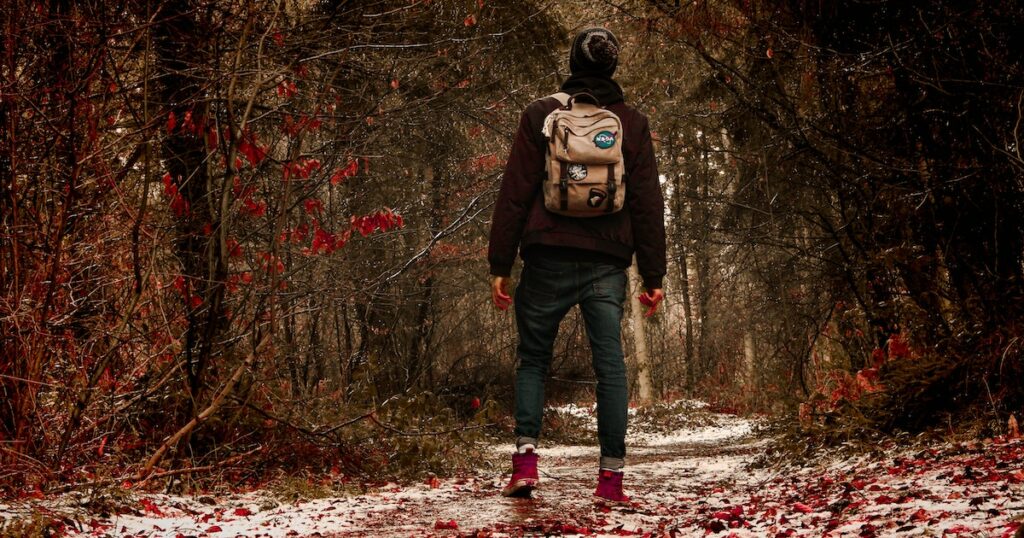
Building Fitness and Preparing for Your First Trip
To ensure a successful backpacking trip, it’s important to build up your physical fitness levels beforehand. Here are some tips to help you get ready:
Gradually Increase Physical Fitness Levels
Start by gradually increasing your physical fitness levels before embarking on longer hikes. This will help prevent injuries and make the experience more enjoyable.
Begin with shorter walks or hikes, and slowly increase the distance and difficulty over time.
Strength Training Exercises
Incorporate strength training exercises into your routine to improve endurance while carrying a heavy pack.
Focus on exercises that target your legs, core, and upper body. Squats, lunges, planks, push-ups, and shoulder presses are great options.
Cardio Workouts
Cardiovascular fitness is crucial for backpacking trips as they can involve long hours of walking with a heavy load.
Include cardio workouts such as running, cycling, or swimming in your routine to improve stamina and cardiovascular health.
Acclimate Yourself to Higher Altitudes
If you’re planning a trip to higher altitudes, it’s essential to acclimate yourself beforehand.
Gradually increase your elevation during practice hikes or consider spending a few days at higher altitudes before your trip.
This will help reduce the risk of altitude sickness.
Remember that building fitness takes time; don’t rush the process. Listen to your body and give yourself enough rest between workouts.
It’s also important to consult with a healthcare professional before starting any new exercise regimen.
By following these tips and gradually building up your fitness levels, you’ll be well-prepared for your first backpacking adventure!
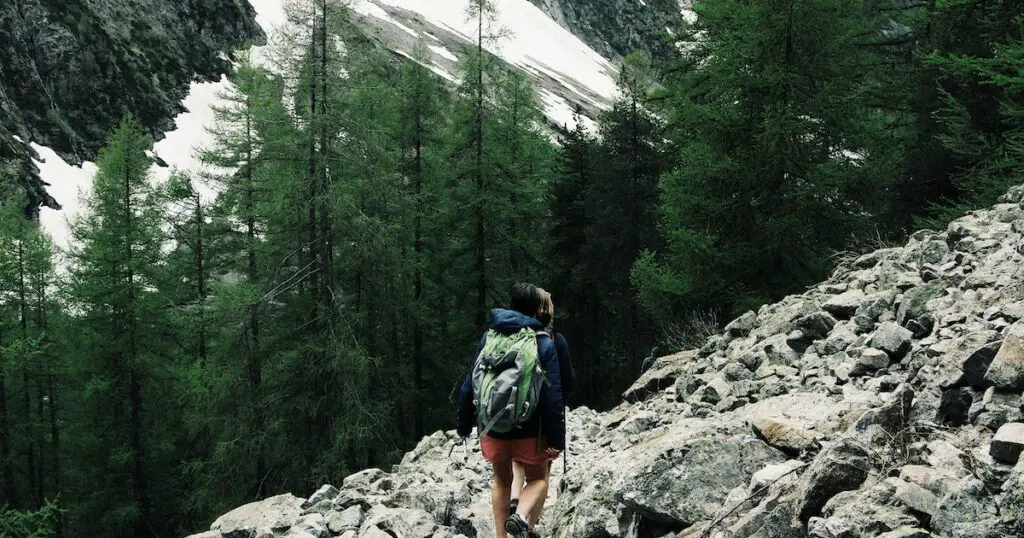
Choosing the Perfect Trail and Understanding Leave No Trace Principles
Choosing the right trail is crucial. You need to consider factors like difficulty level and scenery. Look for popular trails in national parks or trusted sources that match your hiking abilities.
Factors to Consider when Selecting a Trail
- Difficulty Level: Pick a trail that aligns with your fitness level and experience. Beginners should start with easy or moderate trails.
- Scenery: Decide if you prefer mountain views, waterfalls, or lush forests. Research different trails to find the landscapes that excite you.
The Importance of Leave No Trace Principles
To preserve our beautiful environment, it’s important to follow Leave No Trace principles while backpacking.
Tips for Minimizing Your Impact on Nature
- Pack It In, Pack It Out: Take all your trash with you and leave nothing behind.
- Stay on the Trail: Stick to designated paths to avoid damaging vegetation and disturbing wildlife.
- Stream Crossings: Use established crossings rather than creating new ones, as this can harm fragile ecosystems.
- Respect Wildlife: Observe animals from a distance and never feed them.
- Proper Disposal of Waste: Follow guidelines for disposing of human waste in designated facilities or by burying it at least 200 feet away from water sources.
Understanding Trail Etiquette
When hiking, it’s important to respect other hikers on the trail.
- Yield Right of Way: Let faster hikers pass by stepping aside and allowing them space.
- Keep Noise Levels Down: Enjoy nature’s tranquility by keeping conversations low and avoiding loud music.
- Be Friendly and Courteous: Greet fellow hikers with a smile or a friendly nod.
Remember, following these tips will ensure an enjoyable experience for everyone while preserving our natural surroundings!
Final Thoughts
In conclusion, this blog post has covered a comprehensive range of beginner backpacking tips to help you embark on your first adventure with confidence.
From essential skills and common mistakes to gear selection, fitness building, trail choices.
And Leave No Trace principles, each section has provided valuable insights for novice backpackers.
By following these tips and guidelines, you can ensure a safe and enjoyable experience in the great outdoors.
As you prepare for your first backpacking trip, remember to prioritize safety above all else.
Research thoroughly, plan meticulously, and invest in high-quality gear that suits your needs. Building fitness gradually will help you tackle longer trails with ease.
Always choose trails that align with your skill level and adhere to Leave No Trace principles to preserve the natural beauty of our wilderness areas.
FAQs
1. What are the essential items I should pack for a beginner backpacking trip?
It is crucial to prioritize lightweight and versatile gear. Some essential items include a tent, sleeping bag and pad, cooking equipment, water filter or purifier, navigation tools (map and compass), headlamp or flashlight, extra clothing layers, food supplies (dehydrated meals are popular), first aid kit, toiletries (toothbrush/toothpaste), sunscreen, insect repellent, and a multi-tool.
2. How do I choose the right backpack size?
Selecting the right backpack size is vital for comfort during your trek. Consider factors such as torso length (measure from base of neck to top of hips) and capacity needs based on trip duration (typically measured in liters). It’s recommended to try on different packs at an outdoor store or consult with an expert who can assist you in finding the perfect fit.
3. Can I use regular running shoes for hiking?
While regular running shoes may suffice for short and easy hikes, they are not ideal for more challenging terrain. Invest in a sturdy pair of hiking boots or trail shoes with good ankle support and traction to protect your feet and provide stability on uneven surfaces.
4. How can I prevent blisters while backpacking?
To prevent blisters while backpacking, it’s essential to wear well-fitting socks made of moisture-wicking materials such as merino wool or synthetic blends. Break-in your footwear before your trip, keep your feet clean and dry, apply friction-reducing products like moleskin or blister tape to problem areas, and take regular breaks to air out your feet.
5. What should I do if I encounter wildlife on the trail?
If you encounter wildlife while backpacking, it’s important to remember that you are a visitor in their habitat. Maintain a safe distance and observe from afar without disturbing or approaching the animals. Make noise to alert them of your presence and avoid surprising them. Carry bear spray in bear country as an additional precautionary measure.
6. How can I stay hydrated during my backpacking trip?
Staying hydrated is crucial during a backpacking trip. Carry a sufficient amount of water based on the availability of water sources along your route. Use a water filter or purifier to treat natural water sources before drinking them. Drink regularly throughout the day, even if you don’t feel thirsty, and monitor the color of your urine as an indicator of hydration levels (pale yellow is ideal).

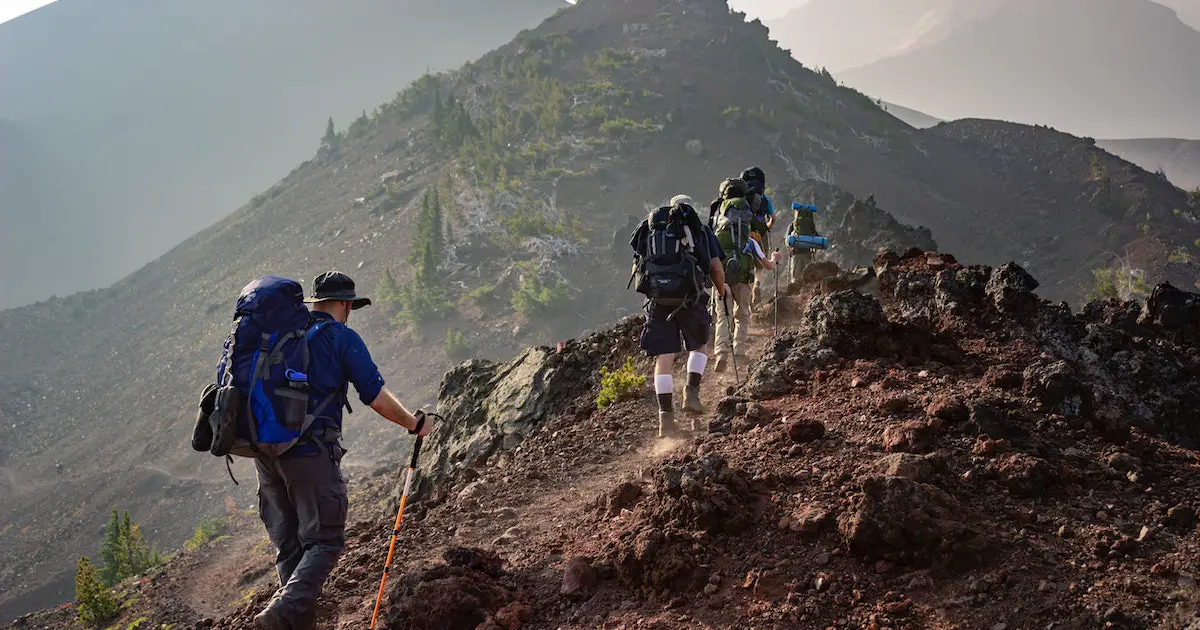

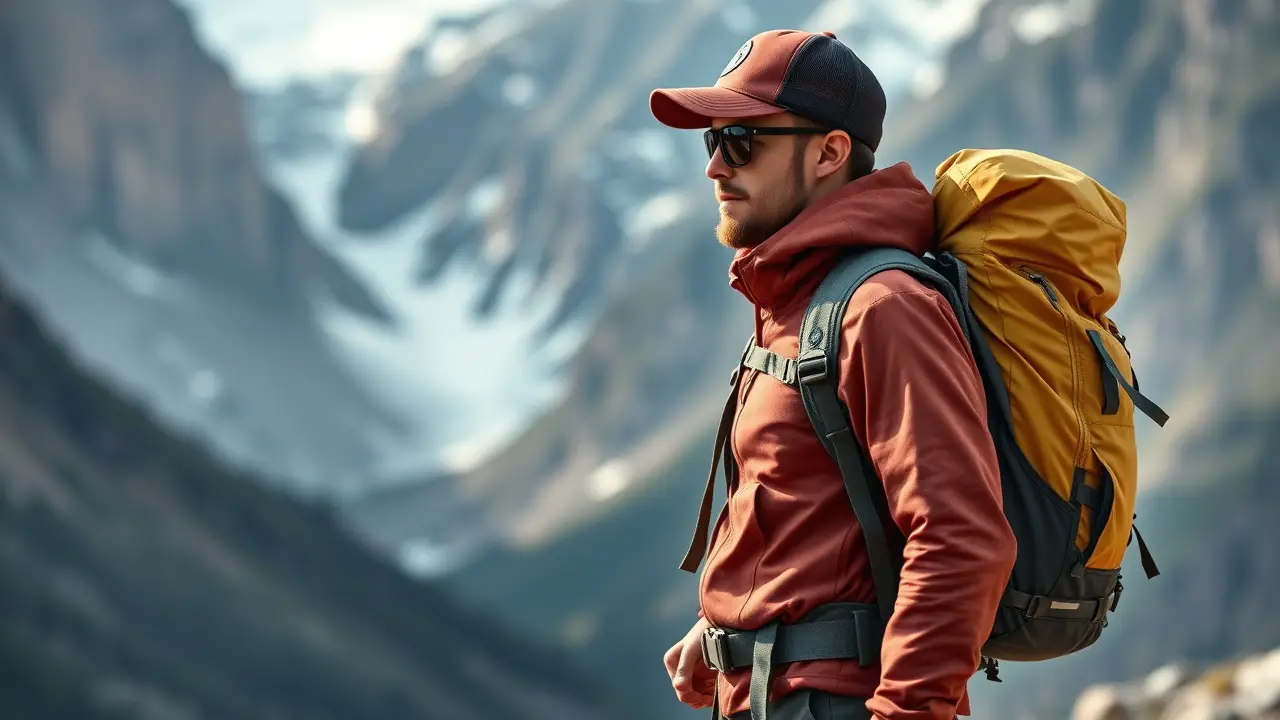
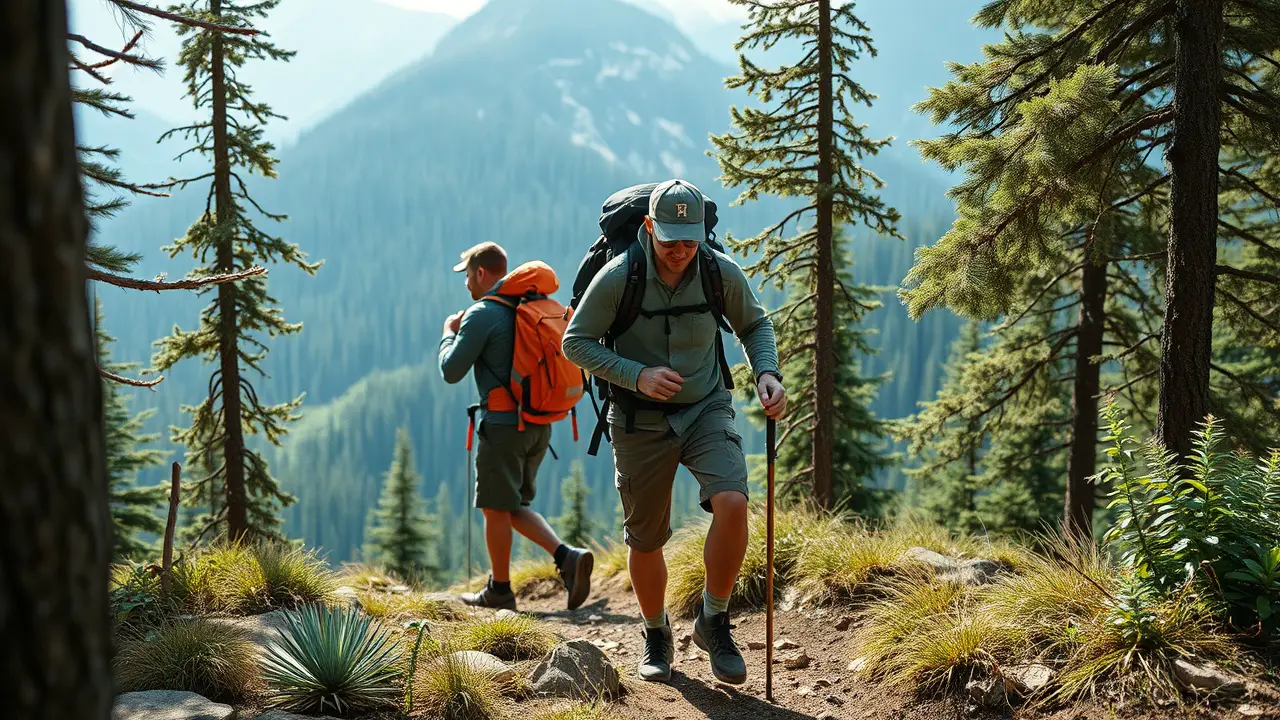
Leave a Reply